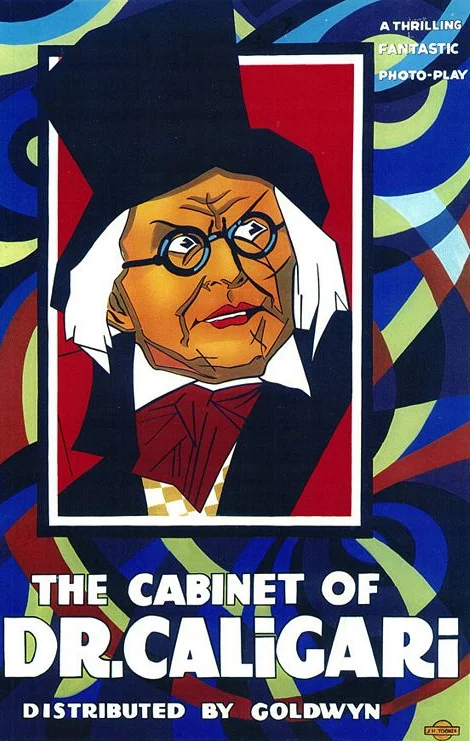- Das Cabinet des Dr. Caligari (1920)
- The Phantom of the Opera (1925)
- The Canary Murder Case (1929)
- The Hunchback of Notre Dame (1923)
- Bronenosets Potyomkin (1925)
- The Ten Commandments (1923)
- Nosferatu (1922)
 One of the best from the silent film era, Das Cabinet des Dr. Caligari, which is translated as
The Cabinet of Dr. Caligari, is the quintessential example of German Expressionism cinema. It's
the jagged shapes in the background that gives the picture a distorted, surreal look.
One of the best from the silent film era, Das Cabinet des Dr. Caligari, which is translated as
The Cabinet of Dr. Caligari, is the quintessential example of German Expressionism cinema. It's
the jagged shapes in the background that gives the picture a distorted, surreal look.
 The Man of a Thousand Faces, Lon Chaney is unforgettable as the Phantom of the Opera. It's he who makes the
film work by doing the makeup himself, and his villain is timeless as ever. The movie is spooky, especially
during the famous unmasking scene.
The Man of a Thousand Faces, Lon Chaney is unforgettable as the Phantom of the Opera. It's he who makes the
film work by doing the makeup himself, and his villain is timeless as ever. The movie is spooky, especially
during the famous unmasking scene.
 A pensive character has never been played so well like William Powell's Philo Vance. He takes his time to think
on screen and measures his words carefully before speaking, becoming credible in the long run. Others would've
made it boring. That's why William Powell was a bona fide star, an impressive feat when Hollywood was in the
middle of its transition from silent to talkie. There's deep intellect involved with the writing being
to the point.
A pensive character has never been played so well like William Powell's Philo Vance. He takes his time to think
on screen and measures his words carefully before speaking, becoming credible in the long run. Others would've
made it boring. That's why William Powell was a bona fide star, an impressive feat when Hollywood was in the
middle of its transition from silent to talkie. There's deep intellect involved with the writing being
to the point.
 Setting the standard of future horror films and establishing Universal as a major studio,
The Hunchback of Notre Dame proves why Lon Chaney was the greatest actor of the silent film era. His
performance as Quasimodo is quite remarkable along with the makeup job.
Setting the standard of future horror films and establishing Universal as a major studio,
The Hunchback of Notre Dame proves why Lon Chaney was the greatest actor of the silent film era. His
performance as Quasimodo is quite remarkable along with the makeup job.
 Bronenosets Potyomkin, aka Battleship Potemkin, is a groundbreaking film for the use of montage,
and the Odessa Steps scene is one of the greatest and most famous ever. It literally changed how the editing
process should be handled. Back then, silent pictures used to be static as the camera stood in one place while
various actors moved around on the same set in full view.
Bronenosets Potyomkin, aka Battleship Potemkin, is a groundbreaking film for the use of montage,
and the Odessa Steps scene is one of the greatest and most famous ever. It literally changed how the editing
process should be handled. Back then, silent pictures used to be static as the camera stood in one place while
various actors moved around on the same set in full view.
 The 1956 version of The Ten Commandments is never going to be topped, but the silent film is a good
start anyway. The orginal only covers from Moses telling Rameses II what he would do to the firstborn children
to leading the Exodus to parting the Red Sea (which was done with a Jell-O that's sliced into two which got
superimposed against a reel of the Israelites walking through) to throwing down the tablets from Mount Sinai.
The 1956 version of The Ten Commandments is never going to be topped, but the silent film is a good
start anyway. The orginal only covers from Moses telling Rameses II what he would do to the firstborn children
to leading the Exodus to parting the Red Sea (which was done with a Jell-O that's sliced into two which got
superimposed against a reel of the Israelites walking through) to throwing down the tablets from Mount Sinai.
 Where most Dracula films fail in, Nosferatu succeeds. It's beautifully made and a prime example of
German Expressionist cinema. Max Schreck is highly memorable as Count Orlok. The name change as well as
everything else is due to not wanting to fall afoul of the copyright infringement in regard to Bram Stoker's book.
Where most Dracula films fail in, Nosferatu succeeds. It's beautifully made and a prime example of
German Expressionist cinema. Max Schreck is highly memorable as Count Orlok. The name change as well as
everything else is due to not wanting to fall afoul of the copyright infringement in regard to Bram Stoker's book.